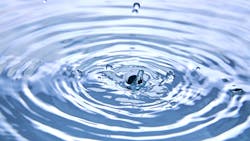Blockchain: Verifying, validating and standardizing water purity
Nobody needs me to tell them how vital a clean, reliable and secure water supply is for… well, everything. The necessity of water has been old news at least since the King of Uruk chiseled his fascinating thought leadership piece “Irrigation: Why the Gods Let Us Live Here” on clay tablets (which have since been lost, probably because they weren’t digitally recorded or even put on blockchain). It is the fabric of life itself and new innovations that protect our water supply have helped to drive civilization and keep us healthy and hydrated. In these fraught times of pollution and climate change, we require these innovations to make sure our water is pure and traceable more than ever before.
Water purification has come a long way since those first irrigation ditches, just like information technology has advanced dramatically since clay tablets. Today, we have the means to monitor our water for nearly any chemical or contaminant, and to monitor the rise and fall in saturation levels.
We can even use analytics to crunch all this data to determine trends in our water purity, and we use artificial intelligence (AI) and machine learning to suggest viable solutions to problems. Sadly, pollution and climate change aren’t our only problems, so how can we safeguard the wealth of data that the information age brings if it also brings with it margin for human error and even the potential for malicious tampering?
Blockchain is how.
Blockwhat?
Blockchain has become a bit of a buzzword these days, along with cryptocurrency and NFTs — two innovations the blockchain was created to protect. But under all this noise there’s an important signal that you may have caught if you understand the primary vulnerabilities of NFTs and crypto — and even more so if you understand how those digital commodities are not that much different than water. Like water, NFTs and cryptocurrency are complex to master and at once tempting and dangerous to tamper with, plus they require an ironclad system to protect against inaccuracies of all sorts. If blockchain technology can protect these online investments, then perhaps it can be just as useful for keeping our water pure.
A digital ledger that arranges information in a sequence (chain) of hashed and encrypted clusters (blocks), blockchain is unique in how it records and shares information. Every piece of data appears in its block in the exact order in which it happened, and cannot be altered in any way without a record being made of that alteration. And a blockchain is shared entirely and in real time to all systems involved — everyone with a copy of the blockchain knows everything going on with the blockchain at all times.
Because everyone in the chain has a copy, no single copy is more authoritative than any other, and a problem with one stakeholder need not affect anyone else’s copy. This gives the blockchain the kind of peerless redundancy, transparency and security ideal for securing our water purification data.
Efficiency and emergency
Water purification teams are always working to further improve techniques, technologies and best practices for ensuring the wholesomeness of our water supply. Blockchain allows these teams to share data with any stakeholders without concern for security or version control. Anytime someone working on a project anywhere in the world has a new idea or makes a breakthrough, up-to-the-moment data on the efficacy of the technique is available to everyone else involved.
As we develop AI-regulated water purification systems and machine learning, this tested and secure data could go right to the controlling AI to make immediate adjustments to water treatment and replicate results from elsewhere.
On the other hand, imagine a purity crisis such as a chemical spill that puts dangerous particles in a local water supply. Whether it poisons crops, livestock or people, containing and cleansing the compromised water becomes an all-consuming priority, especially since water can so quickly travel through an entire area, compromising the water table and local supply for years to come.
If purity testing technology is attached to blockchain, not only is everyone involved informed the second the impurity is detected, there is no opportunity for error or malice to compromise the data along with the water. Everyone with the power to help understands the situation at once and can even take steps to stop or minimize the flow of the contaminated water until it can be purified, or at worst, quickly warn the authorities.
Industrial applications
Blockchain is already making appearances in the water purification industry, especially regarding reusing water for industrial purposes. Genesis Research & Technology Group of Houston, Texas, is purifying the wastewater created by fracking plants — up to 10 barrels of water per barrel of crude oil. Genesis hopes its mobile treatment plants can make the water usable for multiple rounds of fracking, drastically reducing waste, consumption and cost.
To make sure its treatment data is accurate and reliable, Genesis uses the blockchain to store all its data and is even leveraging the system to mint Water Token cryptocurrency with which investors can finance these new innovations.
All tomorrow’s water
Technological advancement in any field is an inspiring source of speculation, and you don’t need to be a science fiction author to imagine the future of water conservation and purification. In the future, we could reuse all our graywater in agriculture or industry, vastly reducing waste. We could desalinate massive amounts of seawater, then replenish it with purified and treated wastewater.
Future purification technologies could even break down and filter plastic solids from our oceans. AI and machine learning are already helping to regulate purification systems and coupled with robotics, could fully remove human labor from the process on an all-but-intellectual level. These robots could be everything from massive, automated purification facilities to microscopic nanites scrubbing the slightest trace of foreign particles from water on command.
No matter what form the future of purification takes, blockchain is the keystone technology that makes it all possible. Without a reliable, transparent and secure system to record minute changes to something as sensitive and precious as the water supply, these technologies go from beneficial to frightening.
Blockchain allows systems to be accurately monitored for changes and discrepancies across multiple points, and to create and reinforce redundancies in sensitive programs. Entered into the blockchain, these redundancies create barriers between error and disaster, and keep many stakeholders at once informed of any changes. Even without a one of these futuristic innovations, blockchain could provide these services now.
Critical solutions
Just like nobody reading this needs to be remined how valuable technology can be to humankind’s use of water, there’s no reason to belabor the precarious state of our water supply. Climate change and water waste are both endangering the human race’s continued access to the most precious and essential of Earth’s natural resources.
If we are to preserve our way of life, let alone prosper, we will need the most effective and precise tools to handle the management and purification of water. Those precise tools require a secure and dependable system to moderate their function, and there is no more secure or dependable system than blockchain.
Robert Galarza is chief executive officer of TruTrace Technologies, developer of the first integrated blockchain platform that registers and tracks intellectual property from genome to sale for the cannabis industry.
About the Author

Robert Galarza
Robert Galarza is chief executive officer of TruTrace Technologies, developer of the first integrated blockchain platform that registers and tracks intellectual property from genome to sale for the cannabis industry.
